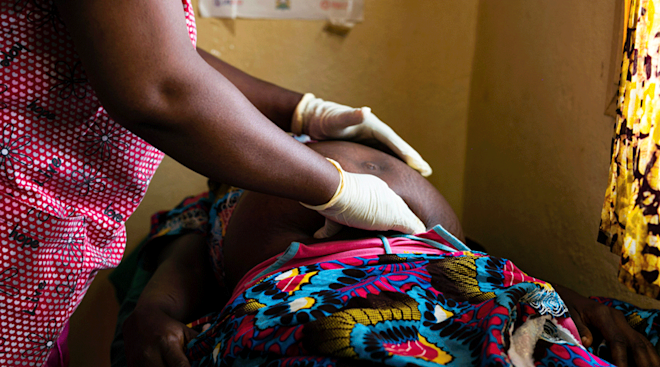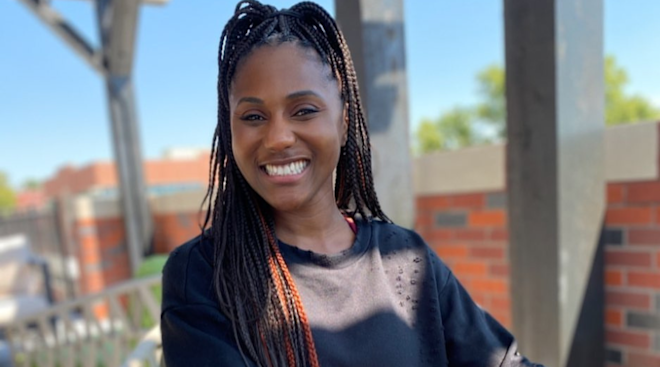How Pain Inequities Impact Black Women in Pregnancy and Beyond
My transition to motherhood shifted from uneventful to chaotic with one prenatal appointment. I had very little time to process it when my son was diagnosed with hydronephrosis—a condition where urine overflows into the kidney, causing it to swell—in utero, and I went from a calculated birth plan to a membrane sweep and induction I hadn’t asked for.
But I had weeks to feel the pain post-labor. As I struggled to walk without pain, my providers said my discomfort was normal. Multiple appointments and an emergency surgery later, I discovered I had a retained placenta, which is when the placenta doesn’t completely come out of the uterus after labor. I felt better after my surgery, but the psychological impact of medical professionals denying my pain persisted. I internalized the message that Black motherhood began with pain. Years later, I learned that the denial of my pain was a crucial manifestation of the structural racism in Black mothers’ birthing and parenting experiences.
“When we think about what systemic racism does to Black people in this country, it harms us, it shortens our lives, it decreases the quality of our lives,” says Uché Blackstock, MD, an emergency physician, founder and CEO of Advancing Health Equity, and author of LEGACY: A Black Physician Reckons with Racism in Medicine.
Blackstock says pain inequity contributes to the more significant racial inequity impacting Black Americans. “When you look at pain inequity, specifically, you can see all of those same trends,” she says. “So when we go to the doctor or go to any health professional, we are ignored, our pain is minimized.”
My journey is one of many examples of the ways in which health-care providers routinely deny Black people’s pain. Advil Pain Equity Project’s Believe My Pain campaign, one of the efforts highlighting Black patients experiencing pain inequity, surveyed 2,000 Americans and found that:
- 93 percent of Black individuals suffering from pain say it impacts their daily life
- Three-quarters of participants say they believe there’s bias in how pain is diagnosed and treated
- 83 percent of Black individuals have had a negative experience when seeking help managing pain
- 66 percent of Black individuals suffering from pain say their pain stayed the same or got worse after a negative experience with a provider
Black moms and birthing people, in particular, often report having their plans ignored during labor—such as receiving unwanted epidurals—and their pain dismissed after birth, according to a recent New York Times report. We experience high rates of birth trauma and obstetric injury, and a higher risk of developing postpartum depression, bipolar disorder and anxiety. Women and birthing people who have experienced psychological birth trauma report higher levels of postpartum mental health issues and often struggle to bond with their infants.
The Black maternal mortality rate is abysmal: 69.9 deaths per 100,000 live births, which is 2.6 times the rate for white birthing people.
Blackstock says when Black people’s physical pain isn’t treated or is minimized, it can start to have a “domino effect.” “What happens is not only is that physical pain not treated—and that is trauma in itself—but we undergo emotional and psychological distress,” she says. “We don’t trust the healthcare system. So we don’t go back, and so our pain gets worse. There’s usually an underlying issue causing the pain, but the underlying health issue doesn’t get addressed. That leads to misdiagnosis, late diagnosis and even death or chronic pain.”
If you’re processing a traumatic experience in the health system or concerned about medical professionals denying your pain during pregnancy or postpartum, you’re not alone. Thankfully, there are a few things you can do to challenge pain inequity.
Take your pain seriously—even if no one else does
Deidra, a mom of five from Irvington, New Jersey, was diagnosed with spontaneous coronary artery dissection, a life-threatening heart condition, shortly after delivery. “I went to the hospital to give birth to my daughter, and about three hours after giving birth to her, I was experiencing a lot of chest pain; I couldn’t move,” she recalls. Her nurse downplayed her symptoms, saying she didn’t need pain relief. After returning home, Deidra struggled to walk and take care of her children. “I stayed in that pain for eight whole days,” she says, noting that her grandfather called an ambulance when she dealt with hot flashes and pain in her arm.
“I told the doctor what I was experiencing right away,” Deidra says. “He ordered a blood test, EKG and ultrasound. And I was really confused. I’m like, why are they ordering all this?” She says she had trusted the previous medical team when they said nothing was wrong. Within 30 minutes, the doctor told her she was having a heart attack. Now, she has five stents and can’t take birth control or other hormonal medication because they increase the risk of her arteries tearing.
What we’re seeing today is not an accident. It’s not a mistake. It’s a result of systemic practices and myths being perpetuated about differences between Black people and other people. It’s about these myths being perpetuated within our medical institutions.
Know there are resources—and use them if you need to
“I would never think at 33 years old, I was having a heart attack,” Deidra says, reflecting on the negligence of the doctors who had sent her home with telltale signs of a heart attack. “I was furious. So I started looking up different things: signs of a heart attack… And it just baffled me that I told this to my doctor and my nurse, and they discharged [me].”
Thankfully, there are resources dedicated to making sure you and your providers know when you’re at risk. March of Dimes offers a list of warning signs of postpartum health problems. Mayo Clinic offers a similar list that includes postpartum complications like infection, cardiovascular diseases and hemorrhage. You can also check out—and save—this list of organizations that support Black moms and their families.
Don’t be afraid to seek a second opinion
“When something doesn’t feel right, it probably isn’t right,” says Deidra, encouraging other Black moms to speak up. Feel empowered to seek a second opinion if the initial response doesn’t seem accurate, and if you’re not comfortable, bring a loved one to do it for you (or with you). “Advocate for yourself; if you have to go to five different healthcare facilities, do that,” advises Deidra. “Because you’re your biggest advocate. Don’t let anybody minimize your pain, because that’s what I did. I let somebody minimize my pain and tell me what I was going through, and then I paid the consequences for it because I didn’t trust myself.”
Add it to the chart
I’ve always wondered whether my birth experience would have gone differently if I weren’t Black. Now that I know more, I wish I’d requested that the providers add each interaction to my chart. Birth advocates note the importance of asking providers to add notes to the chart when they deny your care preferences. It’s a practice that makes it easier to keep a record to look back at if something goes wrong.
Be gentle with yourself
It’s important to acknowledge that the denial of our pain by the healthcare system can profoundly affect our mental health and shape our parenting journeys. “I think there’s this idea of not being listened to when in the most vulnerable state,” says Blackstock. “When you feel you’re not at home in a setting that’s not familiar to you, being treated by probably someone who doesn’t know you, and you’re having discomfort, you feel like your humanity is not being recognized. [If] you’re not given dignified care or being respected, that’s going to impact how you feel psychologically, feeling like you’re not being valued, seen and appreciated.”
It’s hard to heal, physically and emotionally, after a trauma like not being heard by the medical system. It’s okay if you need extra time to process. Finding mental health help like a therapist or joining a support group can be helpful.
Blackstock says many of the injustices we experience in the system are rooted in anti-Black perspectives that stem from slavery, like the belief that Black people have thicker skin or a stronger pain tolerance. “What we’re seeing today is not an accident. It’s not a mistake. It’s a result of systemic practices and myths being perpetuated about differences between Black people and other people. It’s about these myths being perpetuated within our medical institutions,” she says.
After my own experience with health professionals denying my pain, I’m excited that there is a growing number of resources shedding light on the pain inequity Black mothers and birthing people undergo. We’ve got a long way to go. But the more we discuss, the closer we are to changing outcomes—one birth at a time.
Please note: The Bump and the materials and information it contains are not intended to, and do not constitute, medical or other health advice or diagnosis and should not be used as such. You should always consult with a qualified physician or health professional about your specific circumstances.
Plus, more from The Bump:
Uché Blackstock, MD, is an emergency physician, the founder and CEO of Advancing Health Equity, and the author of LEGACY: A Black Physician Reckons with Racism in Medicine. She earned her medical degree from Harvard Medical School.
Boston Children’s Hospital, Hydronephrosis
American Pregnancy Association, Retained Placenta
Advil Pain Equity Project, Pain Inequity: A Public Health Crisis, 2023
The New York Times, Unwanted Epidurals, Untreated Pain: Black Women Tell Their Birth Stories, May 2023
American Psychiatric Association, Maternal Mental Health: A Brief Look at the Impact of Birth Trauma, May 2023
Frontiers in Psychology, Psychological Birth Trauma: A Concept Analysis, January 2023
US Centers for Disease Control and Prevention, Maternal Mortality Rates in the United States, 2021, March 2023
Cleveland Clinic, Spontaneous Coronary Artery Dissection (SCAD), August 2022
March of Dimes, Warning Signs of Postpartum Health Problems, March 2023
Mayo Clinic, Postpartum Complications: What You Need to Know, December 2021
Advil Pain Equity Project, Describing and Documenting Your Pain for Care, 2023
Advil Pain Equity Project, Caregiver’s Guide to Supporting a Loved One Experiencing Pain, 2023
Advil Pain Equity Project, How to Advocate for Yourself in Medical Settings, 2023
Navigate forward to interact with the calendar and select a date. Press the question mark key to get the keyboard shortcuts for changing dates.





















































